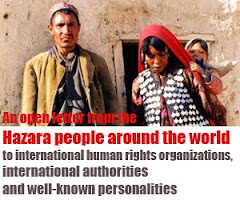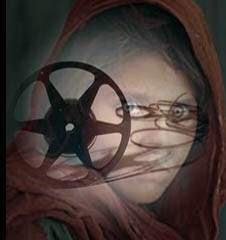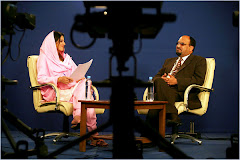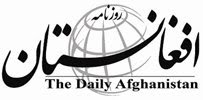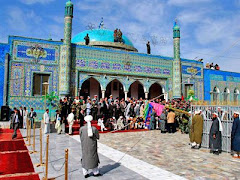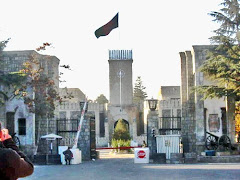
A few days ago, I read two Dari posts in
www.kabulPress.org by Jafar Rezai an Afghan student and blog writer in Canada, which was actually his comments on two of foreign websites with some links; one of them was about
“How the culture of suicide attacks entered in the culture of the Pashtoon terrorists group in Afghanistan called the Taliban”, a study by
Brian Glyn William ¹ a associate professor and researcher for University of Massachusetts at Dartmouth who did this research for
Jamestown Foundation ² (USA) and the next one was another interesting post in
globe and mail.com website ³ that was titled
“Talking to the Taliban” and were some interviews with them.
Seeing these two latest posts about the Taliban once again made me write the following paragraphs and my definitions of the Taliban since I have done research about them for making my feature film “The Keys to Paradise” about them and then list some films that were made about the Taliban or depicted the Taliban in some parts although there have been different opinions about the Taliban’s essence.

While many people in the world especially the people of the involved counties in Afghanistan war wonder about the re-empowerment of and the raise of Taliban again after their defeat in 2002 but the inefficiency of the Afghan government that spoils the international efforts in this country is one of the main reasons for this disaster.
The Taliban as the extremist forces in Afghanistan, as the soldiers of God for the other extremists, as an unresolved enigma for the people of the western world so far have been very well known features of insurgence, terror and intimidations to almost every one in the world.

The power of media has had a major role in their introduction to the world.
Artists, writers, painters, photographers, cartoonists and caricaturists have all written, drawn, painted or depicted them some how in their own ways.
If you go to Google search you find different sizes of Taliban’s' images and if you want to read about, then there are many links in the internet about them. If you look for them in the shelves of libraries, you can find books that are fully or partly about them.
 A short background about the Taliban:
A short background about the Taliban:The word Taliban is heard a lot and day by day getting familiar to every one and because of the image they have given out, they are recognized by the foreigners sometimes, “the most conservative group” in the softest meaning, the “Pashtoons insurgents” or the “ the Pashtoon rabbles, “the extremists” and finally “the terrorists”.
While every one has his own understanding of the word Taliban but still this word brings a fear of terror and intimidation.
But the real meaning of the word Taliban doesn't mean all that what we see today.
Taliban is the plural for the word “Talib” that means seeker and the full Arabic word is TALIBULAELM that means “knowledge seeker” that was called to the scholars and religious students or knowledge seekers who were at first mislead by the Pakistani and Saudi Arabians to form a force to conquer Afghanistan.

So, apparently in the middle of the civil chaos in Afghanistan when a group of people of a particular ethnic “The Pashtoons” wanted to have the power first in the south, and then chance of ruling on the others throughout the country, they were supported by drug traffickers and smugglers when the country was already experiencing lack of rule of law, a chaos in the governing, popularity of opium cultivation, than any time before in the country they picked up guns and called the other young semi literate* Talibs or Taliban (who were studying religious lessons in mosques and madrasas in Pakistan) to join them for power and expansion of real Islam which was believed to be the way they themselves followed in the early 1990s while the actual history of their primary essence, rooting and development needs more discussions and we will written more in depth and details in the near future in this blog.

The first group of Taliban was born in southern province of Kandahar by the external support of Pakistan and Saudi Arabia in Oct 1994 and then they expanded to Zabul, Helmand, Ghazni and other provinces until they reached in Kabul in Sep 1996 and took the governing power of the country and ruled until 2001 which is all apparent to almost all people of the world.
I am very interested to write how the Afghans or foreign filmmakers have depicted the Taliban in their feature films or documentaries.
Although there may have been different documentary and reportage films made by the foreign filmmakers and journalists which some how have been a kind of advantageous media coverage and free advertisement for them but here I would like to list some of the feature films that are made or going to be made about the Taliban or have depicted Taliban partly in them.

The latest film that was going to be made about the Taliban was "The Keys to Paradise" which was stopped in “Development period” while still we are looking for co-producers to support this project and do it the off borders of Afghanistan the soon there are facilities and possibilities to make it.
"The Keys to paradise" Screenplay writer & Director: Mohammad Amin Wahidi
Production name: Deedenow Cinema Productions Afghanistan
Runtime: 60 minutes
Language: Dari and Pashto
Subtitle(s): English
Status: The project was stopped due to security problems of the screenwriter- director
Filming locations: To be rescheduled
Synopsis: please see the more details about this film in the link of the post about it.

The first film made after the Taliban about them was the Feature film OSAMA directed by famous Afghan director Seddiq Barmak and was filmed in 35 mm which was financially supported by Japanese and Iranian co-producers.
It is to say that this director had “The Opium War” another feature in 35 mm in post production in late 2007 which I don’t know more about.
“Osama” Duration: 83 minutes
Screenplay writer: Seddiq Barmak
Director: Seddiq Barmak
Production year: 2003
Language: Dari
Subtitle: English
Filming locations: Kabul and its suburbs
Synopsis:
Osama is a girl who lives with her mother and grand mother in Kabul during the Taliban Regime. The Taliban prohibit the women doctors and her mother has no job any more and can not work in the hospital.
Then Osama has to get dressed as a boy to work in a shop for one his father’s friends.
One day the Taliban Mullahs take the boys by force to the Madrasas to teach religious lessons and Osama is taken with them.
During the lessons of who to take GHOSL “or Islamic bath” for girls and for boys, then the Mullah who teach these lessons realizes that Osama is not a girl but actually is a girl therefore they want to punish her, finally the teacher old Mullah releases her from the court of Taliban and marries the 12 years old Osama while he has already two other wives in the same house.
 The Kite Runner
The Kite Runner (USA)
Duration: 128 minutes
Screenplay writer: (adapted) David Benioff
Novelist: Khaled Husseini
Director: Marc Forster
Production year: 2007
Language: Dari – English – Pashto
Subtitle: English
Filming locations: USA- China - Pakistan
Synopsis:
This film is currently on the screens of the cinemas in which the Taliban are not the main theme but has a review of the overall situation of the country during the Taliban in a long part of it; especially some scenes depicted in this film during the Taliban are; stoning the women, how wildly they behaved with the children, and what kind of people joined the Taliban for different purposes.
 Kabul Express
Kabul Express (India)
Duration: 105 minutes
Screenplay writer: Kabir Khan, Sandeep Srivastava
Director: Kabir Khan
Production year: 2006
Language: Dari – Urdu -
Subtitle: English
Filming locations: Kabul and its suburbs and Parwan (Afghanistan) and India
Synopsis:
This film shows the relation of the Taliban with Pakistan.
The main story runs on two Indian journalists who are kidnapped by a Pakistani Taliban soldier in Afghanistan when the Taliban were escaping under the American Air strikes in late 2001.
But the film changes its direction and interferes in Afghan ethnic clashes in between the Hazaras and the Tajik fighters rather than the main theme, and for this reason screening of this film was banned by the Ministry of Information and Culture in 2006 in Afghanistan.
 “Escape from the Taliban”
“Escape from the Taliban” (India) 2003
Duration: 133 – 166 minutes
Screenplay writer: (adapted) Ujjal Chattopadyaya
Book writer: Sushmita Banerjee
Director: Ujjal Chattopadyaya
Production year: 2003
Language: Urdu
Subtitle: English
“Khaak” Screenplay writers: Sayed Rahim Sayedi- Assadullah Salehi
Director: Sayed Rahim Sayedi
Duration: 90 minutes Production year: 2004
Language: Dari and Pashto
Subtitle(s): English
Filming locations: Kabul- Parwan- Kapisa- Panjsher
Synopsis: This is a pro Northern Alien warlords film and has been made under their strict security and support. This shows the five years resistance of the Northern Alien Warlords against the Taliban. Actually it was one of the three films that I introduced in my cinema show on ATN in 2006 that brought me some messages of threats on that time.
 “Spring of hope”
“Spring of hope” 2006 (depicted the Taliban in some parts)
Screenplay writer:
Director: Hashmat Khan
Duration: minutes
Production year: 2006
Language: Dari and Pashto
Subtitle(s): English
 “The Taliban”
“The Taliban” Screenplay writer: Seddiq Abedi
Director: Seddiq Abedi
Duration: 100 minutes
Production year:
Language: Dari and Pashto
Subtitle(s): English
 Kandahar
Kandahar Film Title: Safar e Qandahar in English (Trip to Kandahar)
Screenplay writer: Mohsen Makhmalbaaf
Director: Mohsen Makhmalbaaf
Duration: 85 minutes
Production year: 2000-2001
Language: Dari and Pashto
Subtitle(s): English






































